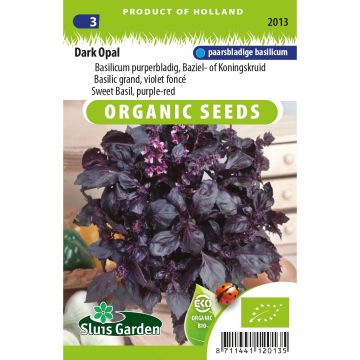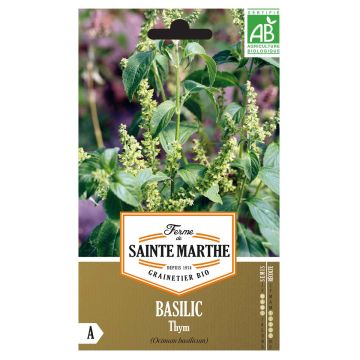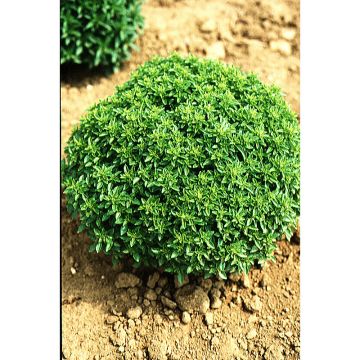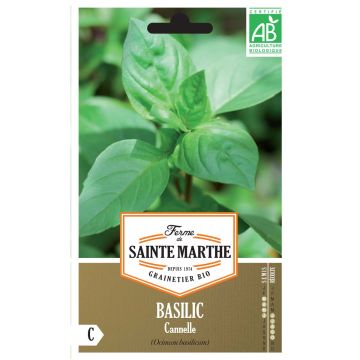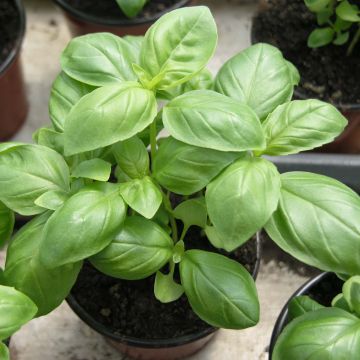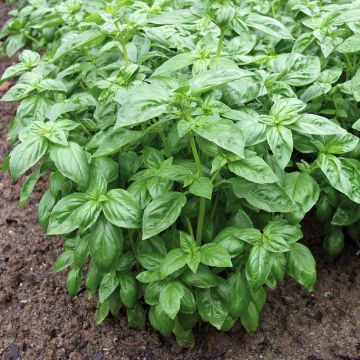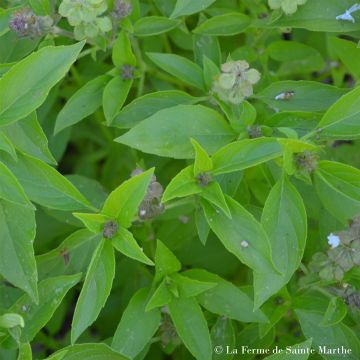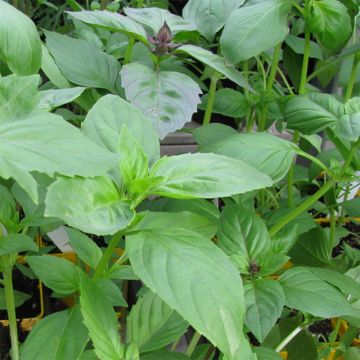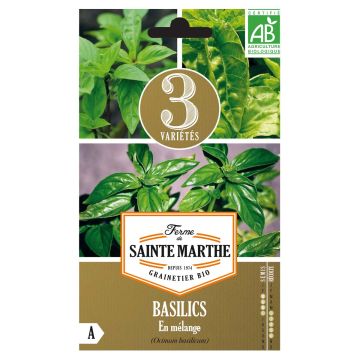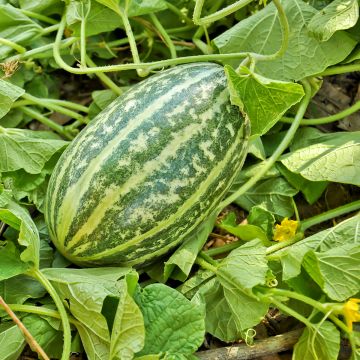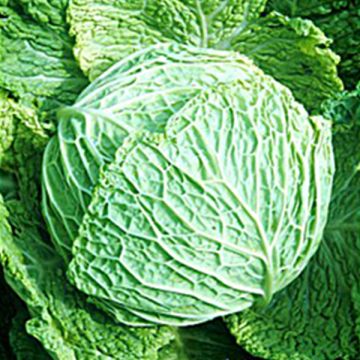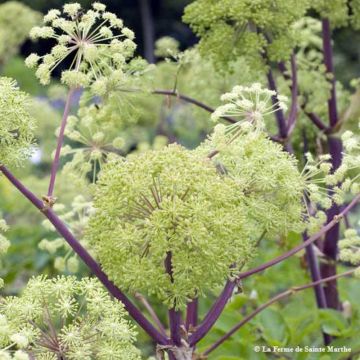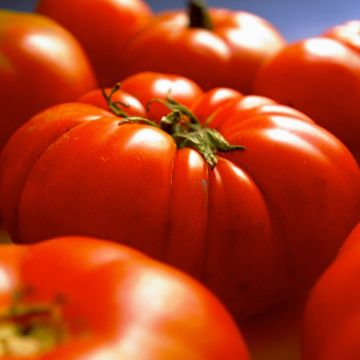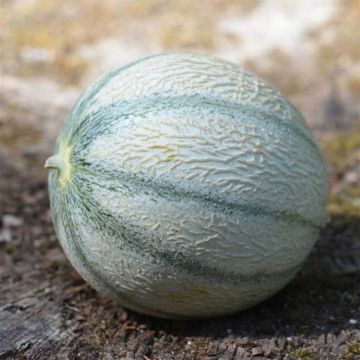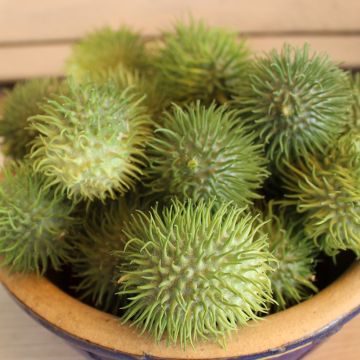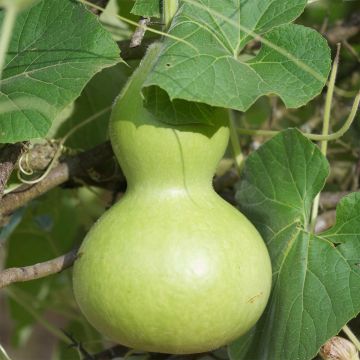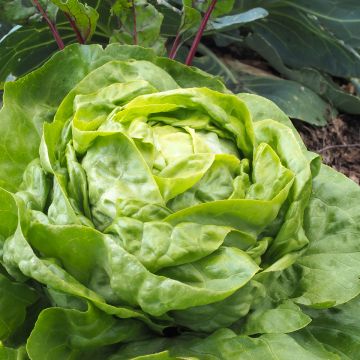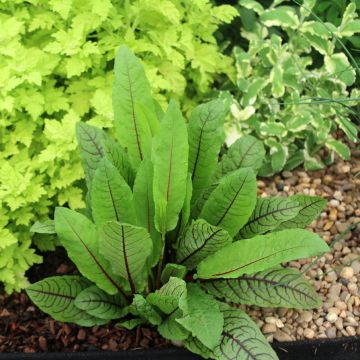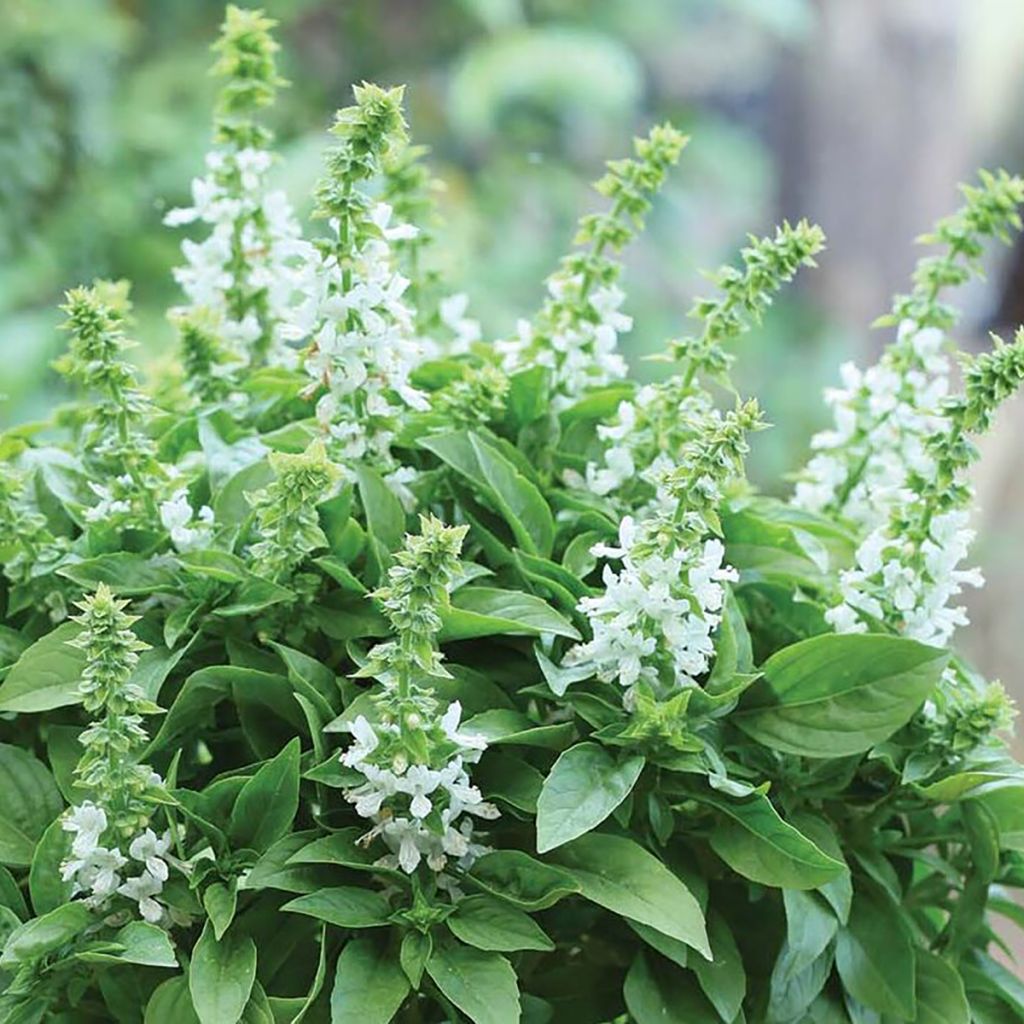

Basil Floral Spires - Ocimum basilicum
Basil Floral Spires - Ocimum basilicum
Ocimum basilicum Floral Spires
Basil
This item cannot be shipped to the selected country
Dispatch by letter from €3.90
More information
Schedule delivery date,
and select date in basket
This plant carries a 6 months recovery warranty
More information
We guarantee the quality of our plants for a full growing cycle, and will replace at our expense any plant that fails to recover under normal climatic and planting conditions.
Seed-only orders are dispatched by sealed envelope. The delivery charge for seed-only orders is €3.90.
Description
The Floral Spires Basil is a similar variety to Thai basil. It is a highly ornamental, compact plant with pointed leaves and beautiful white flowering. The fragrance, characteristic of Thai basils, is aniseed. Its leaves remain vibrant green, without the usual purple colouration of Asian basils. Plant it for its specific aroma, for curries, broths, the whole repertoire of Thai cuisine, or to explore unexpected combinations, as well as for its aesthetic qualities.
Basil is an aromatic plant that grows 30 to 40 cm tall. Its stems are erect and branched, with a square section like most Lamiaceae. They bear oval leaves, the size and colour of which (ranging from light green to purple) vary depending on the variety. Its small flowers are white or mauve and grouped in spikes.
Basil is widely used in Mediterranean cuisine, as well as Asian cuisine. Its fresh or dried leaves are consumed in salads, marinades, or sauces (pesto) accompanying pasta, meat, or fish.
Basil flowers contain an essential oil based on eucalyptol and eugenol. Its use helps fight anxiety and infections, as it has calming and relaxing properties as an antispasmodic and antibacterial.
In the garden, Basil thrives in well-drained humus-rich soil. It particularly dislikes cold and excessive humidity. It should be planted in non-scorching sun or partial shade.
Harvest: from early summer to autumn, harvest the leaves as you need them, simply by cutting them by hand or with scissors.
Storage: it is possible to store dried leaves in airtight containers. Freezing is also an option, but your basil may lose some of its flavour.
Gardener's tip: Drought tends to cause basil to go to seed, you can pinch off the inflorescences and water it to stimulate the production of new leaves.
Report an error about the product description
Basil Floral Spires - Ocimum basilicum in pictures
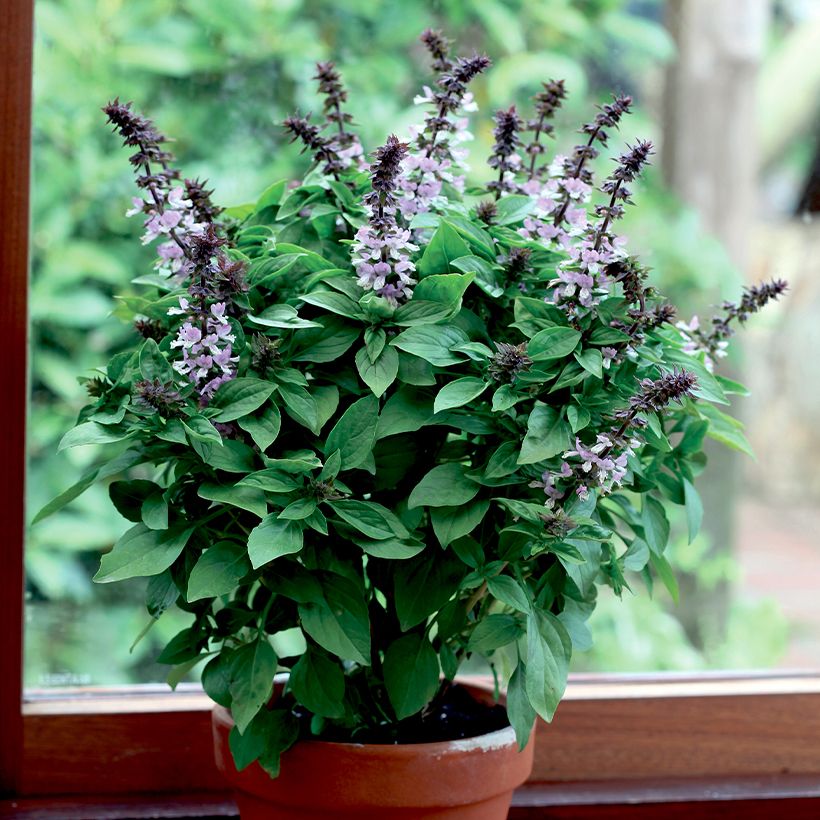

Harvest
Plant habit
Foliage
Botanical data
Ocimum
basilicum
Floral Spires
Lamiaceae
Basil
Southeast Asia
Annual
Other Basil seeds
Planting and care
Sowing and Maintenance:
Basil prefers relatively moist, well-drained and humus-rich soils, as well as partial shade: direct sunlight tends to burn the leaves. It grows very well in pots.
Sowing: Sow in spring, starting in February under a cover or in a greenhouse, and April until early summer in open ground. Sow in a well-spaced furrow about ten centimetres wide and two centimetres deep. The rows should be spaced 25 cm apart. Cover the seeds with the soil spread along the furrow and then water. Germination takes between 10 to 15 days. As soon as the first plants appear, thin them out slightly. The more staggered the sowing, the longer the harvest period will be. Sowing can also be done in pots or plugs to be transplanted when the plant reaches 10 cm (4 to 6 leaves) in height. Basil can be kept in a pot to be available in the kitchen if it is bright enough.
When transplanting, space your plants 20 cm apart in all directions.
Maintenance: Maintenance is low and only requires regular watering (or preventative mulching) when the soil dries out. It is the lack of water (water stress) that can cause basil to bolt and go to seed.
Seedlings
Care
Intended location
This item has not been reviewed yet - be the first to leave a review about it.
Vegetable seeds
Haven't found what you were looking for?
Hardiness is the lowest winter temperature a plant can endure without suffering serious damage or even dying. However, hardiness is affected by location (a sheltered area, such as a patio), protection (winter cover) and soil type (hardiness is improved by well-drained soil).

Photo Sharing Terms & Conditions
In order to encourage gardeners to interact and share their experiences, Promesse de fleurs offers various media enabling content to be uploaded onto its Site - in particular via the ‘Photo sharing’ module.
The User agrees to refrain from:
- Posting any content that is illegal, prejudicial, insulting, racist, inciteful to hatred, revisionist, contrary to public decency, that infringes on privacy or on the privacy rights of third parties, in particular the publicity rights of persons and goods, intellectual property rights, or the right to privacy.
- Submitting content on behalf of a third party;
- Impersonate the identity of a third party and/or publish any personal information about a third party;
In general, the User undertakes to refrain from any unethical behaviour.
All Content (in particular text, comments, files, images, photos, videos, creative works, etc.), which may be subject to property or intellectual property rights, image or other private rights, shall remain the property of the User, subject to the limited rights granted by the terms of the licence granted by Promesse de fleurs as stated below. Users are at liberty to publish or not to publish such Content on the Site, notably via the ‘Photo Sharing’ facility, and accept that this Content shall be made public and freely accessible, notably on the Internet.
Users further acknowledge, undertake to have ,and guarantee that they hold all necessary rights and permissions to publish such material on the Site, in particular with regard to the legislation in force pertaining to any privacy, property, intellectual property, image, or contractual rights, or rights of any other nature. By publishing such Content on the Site, Users acknowledge accepting full liability as publishers of the Content within the meaning of the law, and grant Promesse de fleurs, free of charge, an inclusive, worldwide licence for the said Content for the entire duration of its publication, including all reproduction, representation, up/downloading, displaying, performing, transmission, and storage rights.
Users also grant permission for their name to be linked to the Content and accept that this link may not always be made available.
By engaging in posting material, Users consent to their Content becoming automatically accessible on the Internet, in particular on other sites and/or blogs and/or web pages of the Promesse de fleurs site, including in particular social pages and the Promesse de fleurs catalogue.
Users may secure the removal of entrusted content free of charge by issuing a simple request via our contact form.
The flowering period indicated on our website applies to countries and regions located in USDA zone 8 (France, the United Kingdom, Ireland, the Netherlands, etc.)
It will vary according to where you live:
- In zones 9 to 10 (Italy, Spain, Greece, etc.), flowering will occur about 2 to 4 weeks earlier.
- In zones 6 to 7 (Germany, Poland, Slovenia, and lower mountainous regions), flowering will be delayed by 2 to 3 weeks.
- In zone 5 (Central Europe, Scandinavia), blooming will be delayed by 3 to 5 weeks.
In temperate climates, pruning of spring-flowering shrubs (forsythia, spireas, etc.) should be done just after flowering.
Pruning of summer-flowering shrubs (Indian Lilac, Perovskia, etc.) can be done in winter or spring.
In cold regions as well as with frost-sensitive plants, avoid pruning too early when severe frosts may still occur.
The planting period indicated on our website applies to countries and regions located in USDA zone 8 (France, United Kingdom, Ireland, Netherlands).
It will vary according to where you live:
- In Mediterranean zones (Marseille, Madrid, Milan, etc.), autumn and winter are the best planting periods.
- In continental zones (Strasbourg, Munich, Vienna, etc.), delay planting by 2 to 3 weeks in spring and bring it forward by 2 to 4 weeks in autumn.
- In mountainous regions (the Alps, Pyrenees, Carpathians, etc.), it is best to plant in late spring (May-June) or late summer (August-September).
The harvesting period indicated on our website applies to countries and regions in USDA zone 8 (France, England, Ireland, the Netherlands).
In colder areas (Scandinavia, Poland, Austria...) fruit and vegetable harvests are likely to be delayed by 3-4 weeks.
In warmer areas (Italy, Spain, Greece, etc.), harvesting will probably take place earlier, depending on weather conditions.
The sowing periods indicated on our website apply to countries and regions within USDA Zone 8 (France, UK, Ireland, Netherlands).
In colder areas (Scandinavia, Poland, Austria...), delay any outdoor sowing by 3-4 weeks, or sow under glass.
In warmer climes (Italy, Spain, Greece, etc.), bring outdoor sowing forward by a few weeks.

































